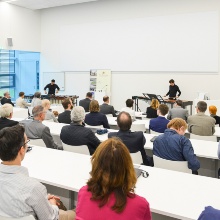In addition to conducting research and providing high-performance computing (HPC) services to academic and industrial users, the High-Performance Computing Center Stuttgart (HLRS) is a European leader in training scientists, programmers, and system developers in the use of HPC. As simulation and data analytics become increasingly essential tools across many fields of research and technology, the need is greater than ever for people trained with such skills.
To address this demand, HLRS recently undertook a major expansion, opening a new building that is making it possible to provide HPC training to more visitors than ever. Funded for a sum of €6.8 million by HLRS, the approximately 1000 square-meter facility opened its doors on March 7. The building offers a state-of-the-art lecture hall, smaller seminar rooms, and space to expand HLRS staff. It will enable HLRS to expand its continuing professional training and support other educational symposia for students and the general public.
At an inauguration ceremony on July 14, 2017, Annette Ipach-Öhmann (Director, Baden-Württemberg State Office of Real Estate and Construction), Gisela Splett (State Secretary, Baden-Württemberg Ministry of Finance), Hans Reiter (Baden-Württemberg Ministry of Science, Research, and Art), Isabel Fezer (Minister for Youth and Education, City of Stuttgart), and Simone Rehm (Chief Information Officer, University of Stuttgart) delivered a series of speeches celebrating this milestone, spotlighting the important role that the new training center will play in the future of HPC research and education for Stuttgart, Baden-Württemberg, Germany, and the world.
Following a musical greeting performed by students from the Stuttgart Academy of Music and Performing Arts, Annette Ipach-Öhmann began the event by pointing out that the new HLRS training facility is the final pillar in the institute’s growth, which began in 2005 with the opening of its main building and went through expansions in 2011 and 2012. In her welcoming remarks she greeted the other speakers and recognized many key individuals who collaborated on the planning and realization of the new facility, including government representatives, administrators and staff at the University of Stuttgart, as well as the architecture firm Wenzel + Wenzel, Pfefferkorn Engineers, and artistic director Harald F. Müller.
Gisela Splett remarked that although the „manicured understatement“ of the area surrounding HLRS and the University of Stuttgart’s Vaihingen campus may be deceiving, the supercomputer that HLRS maintains — presently ranked 17 on the Top500 list — is a global "lighthouse" for advanced science and research. The opening of the new HLRS training facility, she suggested, constitutes an important step in raising the visibility of HLRS and will enhance its global reach. "This will be a meeting point for a network that will play an important role in future generations for the scientific and industrial competitiveness of Baden-Württemberg and Europe," she said. Commenting on the elegance of the building itself, Splett remarked, "I’m impressed by how peaceful the atmosphere is... It creates an environment that is appropriate to the high standards of what happens here." Splett also pledged that supporting high-performance computing will remain a priority for Baden-Württemberg in the future.
Hans Reiter emphasized the significance of the new training center in the context of digital@BW, the digitalization strategy for research and education that is currently being pursued by the majority political coalition in Baden-Württemberg. Considering the crucial role that data analytics, simulation, and visualization play in key industries and research projects across the region, Reiter argued, "we need a first-class IT infrastructure for high-performance computing so that science and business can remain internationally competitive in the future." For this reason, the state is not only promoting the development of supercomputing infrastructure but is also intensifying its support for HPC users, both in academia and in small to mid-sized businesses. The opening of the new HLRS training center, he suggested, will "both qualitatively and quantitatively improve training opportunities in high-performance computing," and will be further evidence of the University of Stuttgart's place as the leading scientific center for simulation technology in Germany and in Europe.
Isabel Fezer argued that the opening of the new HLRS training center will benefit not just researchers and industry in the region, but the City of Stuttgart as a whole. "The spirit that has grown and is nurtured here permeates the whole city, improves its reputation, and in the end benefits our children and youth," she enthused. Fezer also celebrated the international networks that develop when professionals from around the world visit institutions like HLRS for training and education. Offering advanced training in topics like HPC, she stated, should spread awareness globally of Stuttgart as a center for advanced research and technology.
Simone Rehm saw in the opening of the new HLRS training center the fulfillment of an important component of its mission as a part of the University of Stuttgart. "You all know the saying 'Do good and talk about it,'" she mused. "Today I’d like to modify the saying and suggest we should 'Do good and teach about it.'" She argued that HLRS should continually seek to disseminate the knowledge that emerges from its research, and that the new training center offers exciting new opportunities to do so.
Professor Michael Resch, Director of HLRS, closed the event by thanking the state, federal, city, and university agencies that contributed to the growth of HLRS over the past several years. He also recognized the support that the University of Stuttgart contributed to the building, the university departments involved in managing its physical construction, and the HLRS employees whose efforts enable the institute to conduct its work. He also specifically highlighted the unique and critical contributions of Erika Fischer, who worked on behalf of HLRS to manage many facets of the construction of the new building and to ensure that it met the organization’s needs.
Resch highlighted some features of the new building before adjourning the formal program. In a festive mood, the approximately 100 visitors then received tours of HLRS and tested the new building’s reception area, exchanging impressions and ideas over light refreshments.








